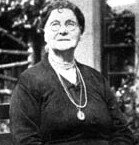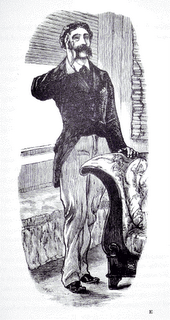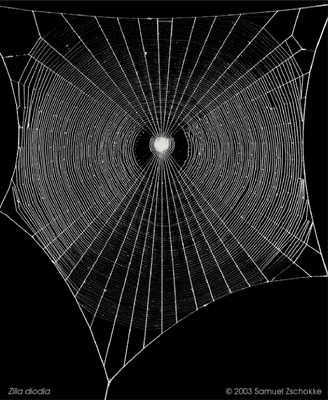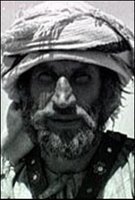I have already written about two people who became famous by virtue of their total lack of talent, or even competence, in their respective fields, and whose utter sincerity and devotion to their work gave them a place in the affections of millions. They were the singer Florence Foster Jenkins and the poet William McGonagall.
 A friend* reminded me last week of a third who might be added to make up a trio of superlative awfulness: the novelist and poet Amanda McKittrick Ros.
A friend* reminded me last week of a third who might be added to make up a trio of superlative awfulness: the novelist and poet Amanda McKittrick Ros.
Her prose was described thus:
Alliterative, flowery, with metaphor extended to breaking point and beyond, while meaning peeks intermittently through and between the words, pressed Humpty-Dumpty-wise into service beyond their accepted limits
and the style was established in her very first romantic novel, Irene Iddeslie (1897):
The silvery touch of fortune is too often gilt with betrayal: the meddling mouth of extravagance swallows every desire, and eats the heart of honesty with pickled pride: the imposury of position is petty, and ends, as it should commence, with stirring strife.
Amanda’s second novel, Delina Delaney, begins with possibly the most incomprehensible opening sentence in any literature:
Have you ever visited that portion of Erin's plot that offers its sympathetic soil for the minute survey and scrutinous examination of those in political power, whose decision has wisely been the means before now of converting the stern and prejudiced, and reaching the hand of slight aid to share its strength in augmenting its agricultural richness?
Her poetry was dreadful enough but not in the McGonagall league because mostly it scans quite well. In one of her patriotic First World War poems, A Little Belgian Orphan, she urges the child, in rousing Kiplingesque terms, to:
Go! Meet the foe undaunted, they're rotten cowards all,
Present to them the bayonet, they totter and they fall,
We know you'll do your duty and come to little harm
And if you meet the Kaiser, cut off his other arm.

I have taken much of the above from Oddbooks, a website which pays due homage to Amanda McKittrick Ros and includes such delights as the story of the quarrel over Lord Dunfern’s trousers (note their strange appearance in this woodcut).
In England we greatly admire ambitious people who are magnificently useless at what they do (Eddie the Eagle, for example), but it seems that other nations are better at producing them: not one of my trio of brilliant failures was English.
*Many thanks to Grumio, the Soho poet, wit, oenophile and boulevardier, for inviting me to join him at a literary festival in Belfast, where there was a reading of Amanda's works last Tuesday, though unfortunately I wasn’t able to go.
The recent weather conditions in the south of England have apparently been good for spiders and they are around in force. I am no arachnophobe and when I find one indoors I usher it outside quite gently, though if I should come across one the size of a football, with hairy legs, I would no doubt scream a bit and run for some wellingtons and a spade to hit it with.
I don’t like it when my face hits a web, but aren’t they wonderful things? There are several huge ones in our garden now; on one, I tried to count the concentric rings and radial lines with the thought of multiplying the numbers together to see how many intersections there were, but this was difficult and I gave up; the tiny constructor remained motionless, no doubt resting a while after framing such fearful symmetry. Nor did I succeed in taking a photograph; I never got up in time to find a web with dew on it and at other times the light wasn’t right.
 But this is what the internet is for; this photo is from a marvellous website which tells you absolutely everything that anyone except arachnologists would want to know about spiders’ webs.
But this is what the internet is for; this photo is from a marvellous website which tells you absolutely everything that anyone except arachnologists would want to know about spiders’ webs.
Watching recently a sober and well researched documentary about modern fundamentalists of various kinds, it struck me how devil-worshippers like dear old Aleister Crowley were really quite cuddly compared with some of today’s pro-God factions. In particular, I had not until then heard much about a terrifying bunch of people called Endtimers: it seems there are millions of these dangerous crackpots, mostly Americans and possibly including George W Bush, who subscribe to the notion that the prophecies in the Book of Revelation are actually going to come true, the key element in their preposterous beliefs.
You can find out more from the many websites which come up if you search for keywords such as Endtime, Armageddon, Rapture and Tribulation, but I wouldn’t bother. I am not providing links to them because reading this mediaeval drivel is such a depressing experience and anyway all you really need to know is in this comment on the TV documentary.
However, I did find one page on a site called RaptureReady which I much enjoyed. Last May I posted a not entirely serious piece about likely accommodation in Heaven, but this topic is dealt with more convincingly here, where there are charming photographs giving a clear idea of the sort of dwellings with which Christian believers will probably be provided. Naturally they are graded according to individual merit, ranging from a rather depressing neo-baronial Super Saint Mansion for top believers all the way down to something that looks like an outside privy, for those whose godly activites were confined to going to church on Sunday.
And a famous earlier guess at how the world will end (or rather, won’t) is here.
Last week’s bright spot was the news that officials hoping to attract tourists to Jerusalem had distributed tens of thousands of leaflets promoting a musical and arts festival held in the city. The sightseeing pamphlet was translated from Hebrew and should have read: "Jerusalem— there's no city like it!". But instead the slogan in English read: "Jerusalem—there's no such city!".
Tourist brochures, like restaurant menus, are notorious for laughable translations. Some years ago Air France used to offer a range of package holidays which they marketed under the name of Welcome Tours, and promoted them with slogans such as: Johannesburg with Air France? You’re welcome!
It was some time before a native English-speaker on the staff of Air France pointed out just what this meant and the posters and brochures were hurriedly withdrawn. Presumably a cheapskate marketing department in Paris had used a locally based translator who did not know that You're welcome is not only a polite formula used in response to an expression of thanks, but may also mean, ironically, Rather you than me.
Not that being a native French-speaker is an excuse for ignorance of this English idiom. A top-flight linguist like Céline, born in Bayonne, has lived in England for twelve years and is as near bilingual as makes no matter but still prefers to translate only from English to French although she interprets both ways. She would never have made a blunder like that.
Only those who know the difference between Ruy Lopez and Jennifer will be following closely the news from Kalmykia this week. In Elista, a small town in this self-governing republic, Veselin Topalov and Vladimir Kramnik, the title holders of international chess's two rival federations, are fighting a series of matches in the World Chess Championships.
The inhabitants of Kalmykia are called Kalmyks, or Kalmuks. Finding out about them throws an interesting light on the story, for many years celebrated in song, which describes quite a different sort of battle: I had always thought of it as an epic fight between representatives of two different civilisations, the Western and the Eastern, or if you like the Christian and the Islamic, which ended in the death of both.

But this was clearly not the case: there is no doubt about Abdul the Bul-Bul Emir’s appearance and background, and I had imagined his opponent as being lean, dark, thin-moustached or possibly looking like this, a high-ranking officer in the Preobajensky Guard:
But:
As Abdul’s long knife was extracting the life
In fact, he was shouting “Huzzah!”
He felt himself struck by that wily Kalmuk
Count Ivan Skivinsky Skivar

The Kalmuks are of Mongol stock, either Buddhist or Muslim, so Ivan probably looked like this.
Nevertheless, country boy or not, Ivan is referred to as “this bold Russian”, so he must have spent much of his life in Moscow and acquired sophisticated skills there:
He could imitate Irving, play Euchre and Pool
And strum on the Spanish guitar
In fact quite the cream of the Muscovite team
Was Ivan Skivinsky Skivar.
and after his death:
There’s a Muscovite maiden her lone vigil keeps
‘Neath the light of a pale Polar star
And the name that she whispers so oft as she weeps
Is Ivan Skivinsky Skivar.
Yesterday I switched on the BBC one o'clock news while I was eating my lunch and heard "....the Prime Minister has confessed that he lied morning, evening and night..."
Then there were shots of burning cars and rampaging mobs. It says something about my perception of our government that it was fully thirty seconds before I realised that, having been masticating carelessly at the time, I had missed a crucial word: they had been talking about a speech made last May by the Hungarian Prime Minister.
Later, we heard that he had also said:
...we have screwed up. Not a little but a lot. No country in Europe has screwed up as much as we have... We have obviously lied throughout the past 18 to 24 months. It was perfectly clear that what we were saying was not true. ...We did not actually do anything for four years. Nothing. You cannot mention any significant government measures that we can be proud of, apart from the fact that in the end we managed to get governance out of the shit. Nothing. If we have to give an account to the country of what we have done in four years, what are we going to say?
It is unthinkable that our own leader would ever speak so colourfully and with such admirable candour. But Mr Ferenc Gyurcsany is not so different from Tony: he has said that he will vigorously suppress the riots and has absolutely no intention of resigning.
According to an absolutely serious, even po-faced, report in the Sunday Times yesterday:
BAE Systems, one of the world’s biggest arms manufacturers, is designing a new generation of ‘green’ munitions”, cutting out “dangerous compounds which can harm the environment and pose a risk to people"
Apparently, among the exciting possibilities under consideration are lead-free bullets, quieter warheads to reduce noise pollution, safer and sustainable artillery, biodegradable plastic for missiles, and grenades that produce less smoke. There have also been experiments to see if explosives can be turned into manure (before they are let off?)
Many will be reassured to learn of these initiatives, which should do much to improve the image of the arms manufacturers. Up to now they have been widely believed to be concerned only with finding better ways of killing people; it is good to know that they are developing ways of doing it quietly and without leaving toxic residues.
However, there is nothing new about the idea of conducting a battle without actually hurting anybody very much: back in the thirties Beachcomber came up with the concept of a powerful gas called Bracerot (nowadays it would be BraceRot, I suppose). In the event of an infantry attack, huge clouds of the gas would be blown towards the enemy troops and when it reached them their braces (or suspenders, if they were American) would quickly disintegrate, their trousers (or pants) would fall down round their ankles, and the advance would be brought to an ignominious halt.
 Looking in the Oxford Dictionary of National Biography for something on the great explorer Wilfred Thesiger I drew a blank and was disappointed to find that his biography will not be included until the January 2007 update. He was 93 when he died in 2003 and one would have thought that they could have been ready to slip him in without hanging about so long, but apparently this is not how their publishing programme works.
Looking in the Oxford Dictionary of National Biography for something on the great explorer Wilfred Thesiger I drew a blank and was disappointed to find that his biography will not be included until the January 2007 update. He was 93 when he died in 2003 and one would have thought that they could have been ready to slip him in without hanging about so long, but apparently this is not how their publishing programme works.
But, as so often happens with reference book browsing, the search led me to an unrelated entry which gave me much pleasure.
 For years I have enjoyed the performances, usually brief cameos, of the actor Ernest Thesiger, who specialised in grotesques such as the cadaverous tycoon in The Man in the White Suit, the mad scientist in Bride of Frankenstein and the Duc de Berri in Olivier’s Henry V. He appeared in nearly 60 films and had a distinguished stage career from 1909.
For years I have enjoyed the performances, usually brief cameos, of the actor Ernest Thesiger, who specialised in grotesques such as the cadaverous tycoon in The Man in the White Suit, the mad scientist in Bride of Frankenstein and the Duc de Berri in Olivier’s Henry V. He appeared in nearly 60 films and had a distinguished stage career from 1909.
But from the ONDB and elsewhere I learnt more about him, in particular that he had been a notable eccentric. He was a great friend (and crochet partner) of Queen Mary and was thought to have based his appearance in a later drag role on her. It is said that he used to lay lilies at the feet of the handsome doorman at the Savoy Hotel in London.
In 1914 he attempted to join a Highland regiment because he rather fancied himself in the kilt, but finally went to France as a private with the Queen Victoria Rifles, taking his needlework with him. In 1945 he published a book entitled “Adventures in Embroidery”.
Alec Guinness relates in his journal that Thesiger was once stopped whilst walking down Piccadilly by a woman who asked him, "Didn't you used to be Ernest Thesiger?", to which he replied "Still am!" and hurried on.
Actually the ONDB biography is rather pedestrian and omits many of the jollier stories about him, in particular his famous comment (sometimes attributed to others) when asked about his wartime experience in the trenches:
My dear, the noise! And the people!
Last year I wrote a post about meeting people on the net and mentioned the advantages of making friends that way. I have since discovered the downside.
Just after that piece was published I saw a note in a now defunct forum from someone who had just started a personal blog called Bonhead under the name of Orso I Tink. This was a rather silly pseudonym but here was something about what he wrote which suggested he would be interesting to know so I left a comment. He wrote a friendly comment back and over the next five months there was an exchange of messages between us, some in comments on his blog, some on mine, and some by email.
When we began writing he was just setting off in a camper with his dog to travel from Albuquerque to Oaxaca, buying craft products on the way and planning to start a retail business when he got there. He wrote an amusing account in his blog of his adventures on the journey and many other things. He also won a little competition I posted (see comments to the post) and we had a friendly argument about the prize.
I used to look forward to reading whatever he wrote and clearly he was enjoying the correspondence as much as I was.
Then, five months later, his blog suddenly disappeared from the net; after a few weeks I emailed him but there was no response. All that was nearly a year ago and I have since heard nothing, which makes me sad. I very much fear that something has happened to him and he never reached Oaxaca.
His first name is Miguel and he was born and grew up in Puerto Rico. He speaks English, Castilian and Catalan and had some Scottish/Irish ancestors named Fletcher and O’Farrell. I know nothing more about him: if there is anyone out there who knows (or knew) him I would be very happy to hear from them.
His own mother called him the Great Beast and he rather enjoyed being described as the wickedest man in the world. This of course was an exaggeration; in a century which saw Hitler, Stalin and Pol Pot operating on a grand scale and Fred West, Paul Dutroux and Ian Brady on a smaller one, such a title is not easy to earn.
However, Aleister Crowley was certainly an extremely nasty character. He inherited a fortune and spent most of it on self-publishing books on the occult and disseminating his racist and sexist views. Some of his poems were banned, dealing lyrically as they did with such themes as paedophilia, bestiality and necrophiliac cannibalism.
Wandering the world for some years, he got up to various often silly but always unpleasant activities (such as naming his daughter Nuit Ma Ahathoor Hecate Sappho Jezebel Lilith) in Sicily, Egypt and the Far East. During the First World War he lived in New York and found employment in writing propaganda for pro-German periodicals.
Aleister Crowley died in a Hastings boarding house in 1947 at the age of 72, penniless and addicted to heroin. An obscure local magazine recently had an article about him asserting that before he died he cursed the town, though it is not known what this pleasant seaside resort had done to upset him.
As it was a quiet week for news in the south-east the BBC sent a reporter to question Hastings residents about their feelings towards Crowley and his curse. It was not clear how many people were approached and said “Who?”, but eventually some were found who were prepared to testify that they were conscious of his continuing malign influence on Hastings and even one man who said he was frightened to speak Crowley’s name, and another who thought it "incredibly likely" that there is still a dedicated army of his followers in the town. A couple, looking distinctly embarrassed, demonstrated some allegedly sinful but rather feeble-looking satanic ritual and, accompanied by some creepy sound library music and with some awed comments from the presenter, all this piffle made up an item which the BBC astonishingly thought was worth broadcasting several times last week.
Although his cursing had no discernible effect and his books and his general carryings-on are now of little interest, he apparently had and still has an influence on modern popular culture, which perhaps says more about modern popular culture than it does about this dreary charlatan.

He's behind you!
He chose this photo for the cover of one of his books, obviously not realising that you do not cut much of a figure as the Great Beast 666 if you wear a comic pantomime hat. But the British love comedians and this might be why, in a poll conducted by the BBC in 2002 to find "the 100 Greatest Britons", Crowley was voted number 73. This put him forty-one places behind Eric Morecambe but only seven places behind Charlie Chaplin.
When politicians lay down their heavy burden they often say that this will enable them to spend more time with their family. It is not only arrogance that is causing our leader to cling on to his job until the last possible moment: who could blame him?

Cherie and Euan
Here is an account of an incident. It is not very interesting but reading what the outcome was may be helpful to anyone who is involved in a similar situation.
 Last month someone said to me: “I suppose you know your car's got no front number plate?”. I hadn't noticed, and when I went back to the carwash I had visited earlier that day I found the plate and its plinth lying on the ground. So I filled in a claim form and sent it off with this photograph.
Last month someone said to me: “I suppose you know your car's got no front number plate?”. I hadn't noticed, and when I went back to the carwash I had visited earlier that day I found the plate and its plinth lying on the ground. So I filled in a claim form and sent it off with this photograph.
I then had a standard letter from a heavy mob introducing themselves as the claims handlers for the car wash owners (a major oil company):
Please advise in writing why you are holding our client responsible. For you to succeed in a claim you need to show that [our client] failed to follow legal requirements imposed by legislation, or otherwise failed to do something it should have done, or did something it should not have done.
Without prejudice to liability, please forward two repair estimates in respect of your damage. We are currently making enquiries into this matter.
In reply to this drivel I merely wrote:
…I am holding your client responsible because their car wash tore off the number plate of my car…. The car was a standard model in excellent condition and there can be no reason for it to be damaged other than some fault in the car wash mechanism…. I enclose a repair estimate from the franchised dealer who normally services the car.
Their reply was brilliantly fatuous:
...enquiries do not reveal any liability on the part of [our client]. [Then, repeated, the paragraph about having to prove that their client failed to do something they should have or did something they shouldn’t have…]
We can confirm that there were no reports of any similar claims involving the car wash and no faults with the car wash have been found. In addition, we are able to confirm that 57 vehicles went through the car wash on the above date without incident….. we do not believe that the damage sustained to [sic] your vehicle is the result of a breach of legal duty. Therefore, we regret we cannot be of any financial assistance in this matter.
This was beginning to get more interesting, so I consulted m’learned friends. Their advice was that a judgement could go either way, but that it might be worthwhile to write another letter. So I replied:
I have taken legal advice, and it has been pointed out to me that
1. Your client, on the evidence of the photograph and the receipt which I forwarded to you, does not dispute that their carwash caused damage to my car which cost £107.42 to repair.
2. The fact that your client received no other claims for similar damage on that date or subsequently is irrelevant, as is the fact that no faults have been identified in the carwash machinery.
3. Your client has a duty to ensure that their carwash does not damage any standard model cars put through it. Clearly in this instance—which may or may not have been a unique occurrence—the machinery did cause damage, and a judge is likely to take the view that your client’s denial of liability is nugatory.
Therefore, unless I hear from you before the end of the month that your client has reconsidered the matter of compensation I shall institute proceedings to recover the full cost of the repair.
I was not optimistic, and the only reason I went to so much trouble was because I had waited for years for an opportunity of using the word “nugatory” (quite appropriate here, though it is also what they call factories in Montélimar).
It seemed a good idea to make clear that I was keen to make a substantial nuisance of myself, so my letters were on a heading describing me as Freelance Journalist (which I very nearly was in the fifties), and indicated that they were being copied to Mr Robert Gibbs-Williams of Messrs So-and-So (top City lawyers: I have no idea whether they employ him, or indeed whether he exists at all).
Just before the end of the month I was told, or rather advised, as lawyers say, that:
Our investigations have revealed that no other incidents of that nature have been reported [you’ve already told me that, you idiots]. However, as a gesture of goodwill we are arranging a cheque in the sum of £107.42 to be despatched to you…
So my advice to anyone who suffers a similar misfortune is: Never Give Up.
…or take a dekko
[n. vagrant’s slang, ex Romany dik=to look. In army, common since ca.1890, via Hindustani]
…or have a shufty
[n. or v. RAF, since ca 1925. The origin is Arabic. Note also shufti bint, a (Middle Eastern) woman willing to reveal her charms. Occurs in a vulgar WW2 song about Queen Farida of Egypt]
or, of course, a butcher’s
[n. Rhyming slang, from butcher’s hook. Oddly, the OED can't date this before 1936, though it must be 19th century]
Last Sunday’s edition of the usually trashy Observer colour supplement was packed with useful stuff, a real Thinking Person’s guide to life (or rather Life). You can learn from it, for example, that if you are a Gemini Wednesday’s new Moon promises home overhauls, that you can put blackberries instead of olives into your home-baked focaccia, and that if you are a discontented middle-aged woman with nothing in your life except a nice house, a loving husband and three children you should start a book club and let your husband put the kids to bed once a week.
But those who, like me, strive desperately to keep up with the modern world (I used the word zeitgeist in a post the other day so I mustn’t do it again) will turn eagerly to the Fashion section. Here you will discover that suits and boots are back in business and that the sharp-dressed man should be on the lookout for velvet, mohair and animal prints (actually I’m ahead of them there: my wardrobe contains little else). This is the sort of thing you should be aiming at:

(left) velvet jacket £528, striped shirt £290, green trousers £295, hat, price on request, shoes £418.
(right) velvet jacket £528, hoodie, £160, trousers, £366, shoes £418.
All this kit is available from Liberty’s of Regent Street, if you’ve got £3003 (plus the unknown cost of the hat), but if you and your mate wear it in the street you would be well advised not to leave W1:
But, officer, what do you mean, "Turn out your pockets, you little toe-rags"?
The other day one of my (grown-up) daughters queried the way I said Fat Controller and not Fat Controller (I cannot remember how the subject came up). When I explained, she confessed that throughout her years of devotion to Thomas the Tank Engine in the seventies she had always thought his title meant that he was some kind of dietician, though she could not say why she had imagined expertise of this kind was relevant to the operation of a railway.
Wikipedia has masses of stuff about these feebly anthropomorphic but hugely popular stories which have given rise to a world-wide marketing phenomenon:
The name Fat Controller has been the subject of much controversy because of the supposed political incorrectness of the name. In America in 1989 the ACLU successfully argued that censorship of this name would violate the First Amendment to the United States Constitution. Nonetheless, the nickname has been downplayed in recent years in favour of Sir Topham Hatt. The name is always used with affection in the books and the television series—the adjective "fat" being simply a description. [The railway where the stories are set] also has a Thin Controller and a Small Controller.
The Fat Controller has proven to be a popular figure outside of the world of Thomas. In British slang, the name has come to symbolise any authority figure linked with transportation. The most notable figure of recent years to be compared to Sir Topham is the British Deputy Prime Minister, John Prescott. A rather more contemptuous term, "fat cat controller", has been applied to the executives of transport firms.
 A friend* reminded me last week of a third who might be added to make up a trio of superlative awfulness: the novelist and poet Amanda McKittrick Ros.
A friend* reminded me last week of a third who might be added to make up a trio of superlative awfulness: the novelist and poet Amanda McKittrick Ros.
 But this is what the internet is for; this photo is from
But this is what the internet is for; this photo is from 






